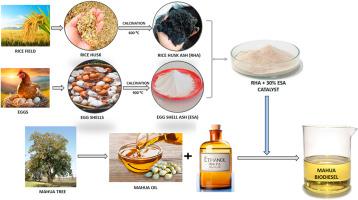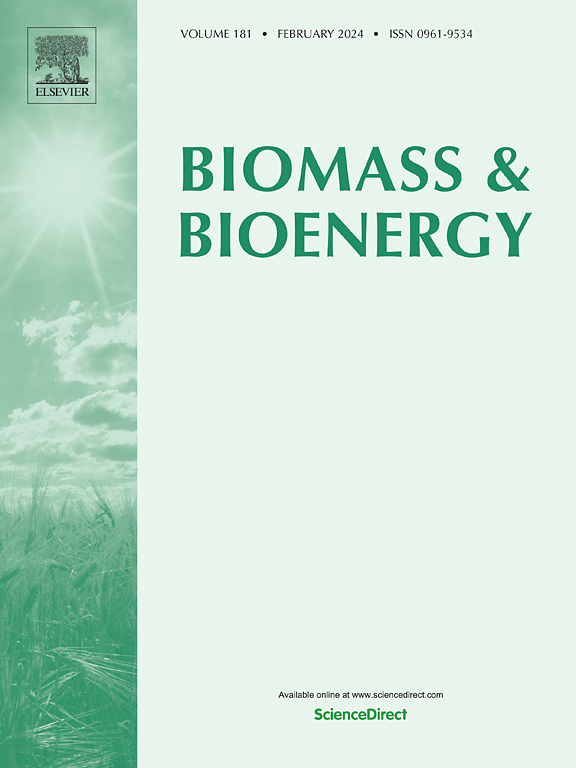蛋壳注入稻壳灰分(RHA)催化稻壳油合成生物柴油的开发、评价及效率研究
IF 5.8
2区 生物学
Q1 AGRICULTURAL ENGINEERING
引用次数: 0
摘要
本研究通过开发一种固体、环保的生物柴油生产催化剂,解决了对可持续燃料替代品日益增长的需求。废蛋壳和稻壳被重新利用来制造一种多相碱性催化剂,提供了一种低成本和高效的解决方案。稻壳经碱处理提取二氧化硅,与蛋壳混合,在800℃下煅烧得到不同比例(10% - 50%)的硅酸钙。其中含有30%蛋壳(RHA+ 30% EH)的催化剂钙(44.58%)和二氧化硅(51.82%)含量最高,被选择用于鲁巴奈油酯交换制生物柴油。优化了工艺参数乙醇油比、催化剂负载、温度和时间,在理想条件下,生物柴油的转化率为94.8%:乙醇油摩尔比为15:1,催化剂重量为2wt %,在80°C下加热150 min。催化剂通过FT-IR、SEM、XRD、XRF和XPS进行了表征,生物柴油产品通过FT-IR、GC和NMR技术进行了验证,符合ASTM标准。该催化剂在5次重复使用循环中保持了其效率,证实了其作为一种可持续、可重复使用和有效的生物柴油合成催化剂的工业应用潜力。本文章由计算机程序翻译,如有差异,请以英文原文为准。

Development, assessment, and efficiency of rice husk ash (RHA) infused by eggshell as a hybrid catalyst towards biodiesel synthesis from iluppai ennai oil
This study addresses the growing demand for sustainable fuel alternatives by developing a solid, eco-friendly catalyst for biodiesel production. Waste eggshells and rice husks were repurposed to create a heterogeneous alkaline catalyst, offering a low-cost and efficient solution. Rice husks were alkali-treated to extract silica, which was mixed with eggshells and calcined at 800 °C to produce calcium silicate in varying ratios (10 %–50 %). Among them, the catalyst containing 30 % eggshell (RHA+30 % EH) exhibited the highest calcium (44.58 %) and silica (51.82 %) content and was selected for transesterification of Lluppai ennai oil into biodiesel. Process parameters ethanol-to-oil ratio, catalyst loading, temperature, and time were optimized, yielding a maximum biodiesel conversion of 94.8 % under ideal conditions: 15:1 ethanol-to-oil molar ratio, 2 wt% catalyst, 150 min at 80 °C. The catalyst was characterized using FT-IR, SEM, XRD, XRF, and XPS, while the biodiesel product was validated via FT-IR, GC, and NMR techniques, meeting ASTM standards. The catalyst retained its efficiency over five reuse cycles, confirming its potential for industrial application as a sustainable, reusable, and effective catalyst for biodiesel synthesis.
求助全文
通过发布文献求助,成功后即可免费获取论文全文。
去求助
来源期刊

Biomass & Bioenergy
工程技术-能源与燃料
CiteScore
11.50
自引率
3.30%
发文量
258
审稿时长
60 days
期刊介绍:
Biomass & Bioenergy is an international journal publishing original research papers and short communications, review articles and case studies on biological resources, chemical and biological processes, and biomass products for new renewable sources of energy and materials.
The scope of the journal extends to the environmental, management and economic aspects of biomass and bioenergy.
Key areas covered by the journal:
• Biomass: sources, energy crop production processes, genetic improvements, composition. Please note that research on these biomass subjects must be linked directly to bioenergy generation.
• Biological Residues: residues/rests from agricultural production, forestry and plantations (palm, sugar etc), processing industries, and municipal sources (MSW). Papers on the use of biomass residues through innovative processes/technological novelty and/or consideration of feedstock/system sustainability (or unsustainability) are welcomed. However waste treatment processes and pollution control or mitigation which are only tangentially related to bioenergy are not in the scope of the journal, as they are more suited to publications in the environmental arena. Papers that describe conventional waste streams (ie well described in existing literature) that do not empirically address ''new'' added value from the process are not suitable for submission to the journal.
• Bioenergy Processes: fermentations, thermochemical conversions, liquid and gaseous fuels, and petrochemical substitutes
• Bioenergy Utilization: direct combustion, gasification, electricity production, chemical processes, and by-product remediation
• Biomass and the Environment: carbon cycle, the net energy efficiency of bioenergy systems, assessment of sustainability, and biodiversity issues.
 求助内容:
求助内容: 应助结果提醒方式:
应助结果提醒方式:


